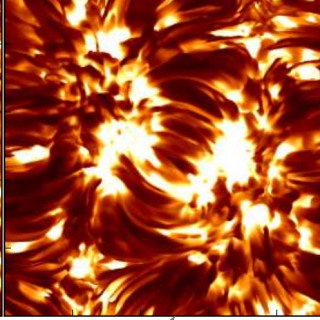Bibcode
Socas-Navarro, H.; McIntosh, S. W.; Centeno, R.; de Wijn, A. G.; Lites, B. W.
Referencia bibliográfica
The Astrophysical Journal, Volume 696, Issue 2, pp. 1683-1688 (2009).
Fecha de publicación:
5
2009
Revista
Número de citas
32
Número de citas referidas
28
Descripción
High-resolution imaging observations from the Hinode spacecraft in the
Ca II H line are employed to study the dynamics of the chromosphere
above a sunspot. We find that umbral flashes and other brightenings
produced by the oscillation are extremely rich in fine structure, even
beyond the resolving limit of our observations (0farcs22). The umbra is
tremendously dynamic to the point that our time cadence of 20 s does not
suffice to resolve the fast lateral (probably apparent) motion of the
emission source. Some bright elements in our data set move with
horizontal propagation speeds of 30 km s-1. We have detected
filamentary structures inside the umbra (some of which have a horizontal
extension of ~1500 km) which, to our best knowledge, had not been
reported before. The power spectra of the intensity fluctuations reveal
a few distinct areas with different properties within the umbra that
seem to correspond with the umbral cores that form it. Inside each one
of these areas the dominant frequencies of the oscillation are coherent,
but they vary considerably from one core to another.
Proyectos relacionados

Magnetismo, Polarización y Transferencia Radiativa en Astrofísica
Los campos magnéticos están presentes en todos los plasmas astrofísicos y controlan la mayor parte de la variabilidad que se observa en el Universo a escalas temporales intermedias. Se encuentran en estrellas, a lo largo de todo el diagrama de Hertzsprung-Russell, en galaxias, e incluso quizás en el medio intergaláctico. La polarización de la luz
Ernest
Alsina Ballester